
1 John 5:14
And this is the confidence that we have toward him, that if we ask anything according to his will he hears us.
Many caregiving families are hesitant to ask for help because they don’t want to lose their privacy, their sense of control, or their pride. If we’re honest, many of us aren’t even sure what we need or how to ask. Even more, we’re not confident people will respond. Fear of rejection is a debilitating condition that impacts the whole family.
“I don’t like to ask for help.”
“Asking people to help me makes me feel very vulnerable.”
“I’m a private person. I would rather not have strangers coming into my home.”
“I don’t want to be too needy.”
“What if nobody responds?”
These are all common and understandable sentiments. All of us in families facing disability or other complex situations understand the dilemma. Asking for help can be so painful. The proverbial saying feels so true about our helpers — we can’t live with them, and we can’t live without them. For a myriad of reasons, we’ll wind ourselves up with stress at night trying to figure out a way to thrive without needing to rely on anyone else.
Those with a robust system of supports say the costs are worth the benefits.
When we weigh the costs of trying to go it alone, our perspective is usually worth reconsidering. Play it out for a moment. What might life look like for you or other family members in 10, 20, or 30 years if you don’t start right now getting better at asking for help?
The consequences of avoiding it range from inadvertent neglect of relationships and imbalanced attention toward siblings to distanced relationships with grandchildren, exhausted and depressed spouses, and radically decreased earning potential for the breadwinner(s) in the home.
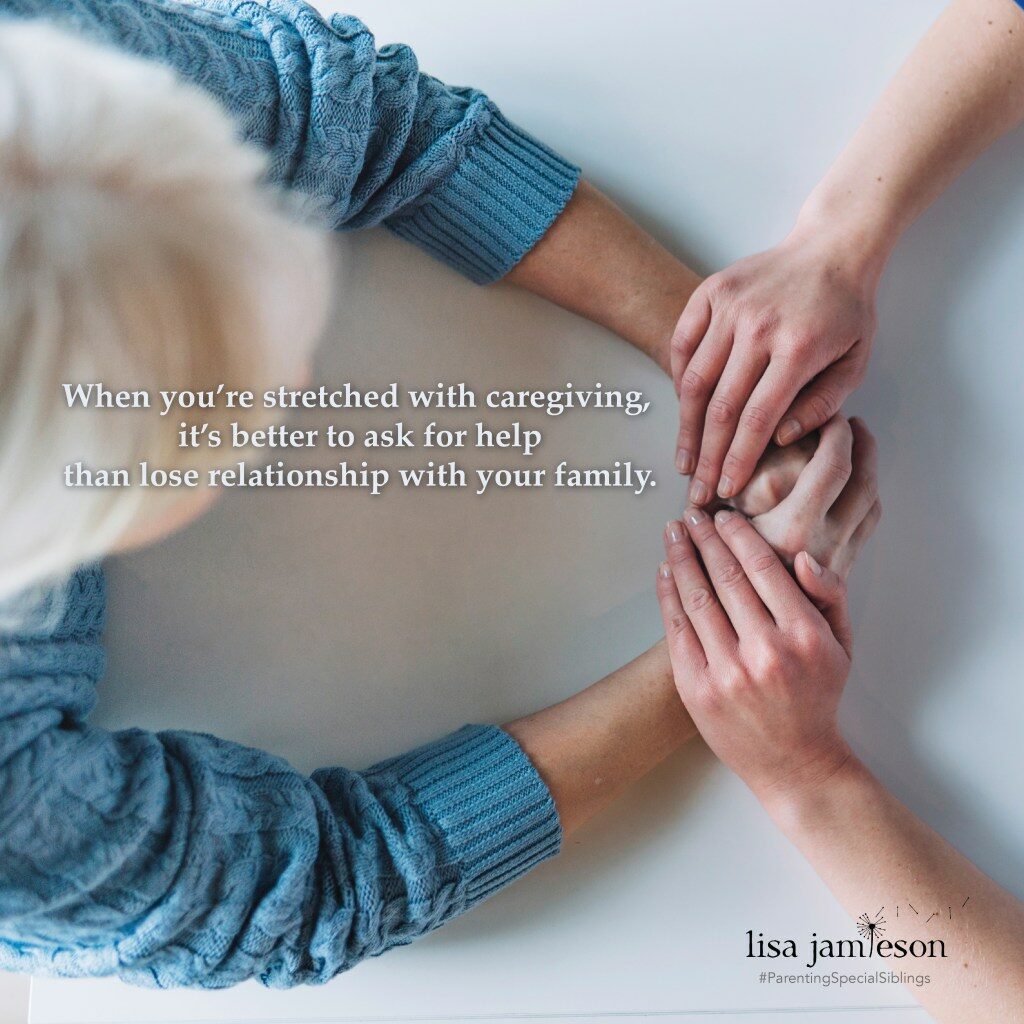
And that’s not all.
When we don’t yield to God’s prompting about asking for help, we get in His way. And it’s never a good idea to get in the way of what God is doing within and around us!
My friend, John Knight, shared this good word in his blog many years ago encouraging special needs parents to move out of God’s way and leave the opportunities wide open for community engagement to develop.
“God calls some to extraordinary acts of love and service.
And if they’re not given a way to express that, they become really really unhappy.
So, we need to stop being afraid of taking advantage.
We need to stop saying to ourselves, ‘someone needs it worse than me.’
We need to not let the enemy win.”
What happens if you put out the call for help but hear crickets? That was my husband, Larry, asked himself over twenty years ago when we were starting to recognize the significance of our daughter Carly’s needs.
RELATED: Carly’s Thanksgiving Story
We learned that it was simply going to require an act of trust — vulnerable trust. If it was truly God’s prompting that we ask for help, He would provide. He would do it in His way and timing. We’ve experienced seasons of remarkable, overwhelming help. And there have been prolonged seasons of painfully listening to crickets.
Over the years, we keep learning that when the response is less than satisfying to us, we should not necessarily receive that as a sign we have done something wrong or that God wasn’t answering.
When the answer we receive from God seems to be “no” or “wait,” it may be about someone else altogether. While He is stretching our patience muscles, it can be about something much broader than our situation. His purposes and ways almost always have to do with many more people than just you and me. For example, if our asking isn’t met with positive response, it may be that someone needs to see the need going unmet. It may be that someone — maybe even many someones — are not being obedient to their own call.
God will meet you with comfort and strength in the waiting season while others are sluggish or stuck in their sin. It’s hard to understand that process and it can feel like rejection. The sting on our hearts is understandable to God. We can ask Him to meet that need too.
If necessary, continue to wait. And don’t quit asking when the Lord prompts you to announce fresh reminders about your needs.
2 Peter 3:9
The Lord is not slow to fulfill his promise as some count slowness, but is patient toward you, not wishing that any should perish, but that all should reach repentance.
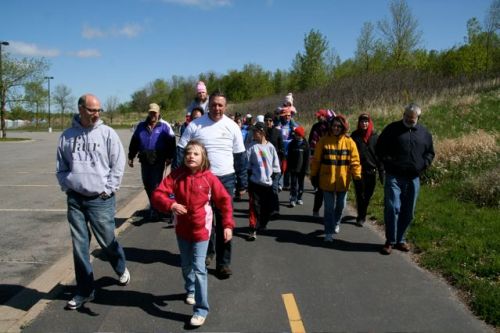
Learn the Art of Delegation
You can’t assume people know that you need help or understand how they can contribute. Most care teams with robust support have learned to be bold and courageous about seeking help. They have learned to delegate. Delegation is an art, not a science. Ultimately, you’ll need to admit that you are powerless and need God’s help with circumstances, relationships, responsibilities, emotional health, and finding encouragement.
You can recruit help among friends, family, neighbors, church members. Recognize that your situation may tug the heart of people close to you but also be intimidating to them. They will probably need training. Sometimes that “training” starts weeks or even years ahead of time. It often begins by a person observing how you interact with your loved one in the natural course of doing life together. Allow people to hang around you, asking questions in their own way and time.
RELATED: “Let Me Know How I Can Help!” (This Will, Because They Won’t)
Build a List
In the meantime, make a list of tasks you’re unable to get to. Keep the list handy for when friends or family do offer to help.
Recognize that you may perceive rejection where it doesn’t exist at all. It is extremely common for caregivers to misinterpret the reasons why they are not getting the help they need or hope for.
RELATED: Defining Roles Can Encourage and Empower Parent Caregivers
His purposes and ways almost always have to do with many more people than just you and me.
Plan for the Worst Days
In between the really hard days, you may feel reasonably confident that you and your family can remain healthy and on track. But that is very difficult without support. Be careful about letting the good days lure you into complacency about cultivating healthy systems and robust resources. Enjoy those great days but plan for the worst days.
Your family will benefit greatly by being proactive in this area. Use the energy you have in those stronger times to be intentional and forward-thinking about how to foster the kinds of supports you’ll need when the harder moments or seasons come.
RELATED: 8 Habits of Caregivers with a Robust Support System
Give Invitations Without Obligation
I have learned one very valuable lesson from one of my own adult daughters who has been learning things through relationships in the national Sibling Leadership Network. Those who grew up with a sibling who had disabilities or other special needs explain that they want invitations to participate without the sense of obligation. Many appreciate offers to be included but they want to maintain their sense of autonomy while making their own decisions about how they get involved.
In her book, Same Lake Different Boat, Stephanie Hubach shares how Joseph, son of Abraham, maintained a proper perspective about the role of people in his life:
“Joseph’s God-centered focus did not preclude his asking for assistance from others. After Joseph revealed the dream of the chief cup bearer, he said to him, “When all goes well with you, remember me and show me kindness; mention me to Pharaoh and get me out of this prison” (Gen. 40:14). Joseph was not afraid to ask for help. Yet Joseph was not demanding. How can we tell? If Joseph’s comments after the revelation of the dream had not been an earnest request but a demand, he would have exhibited an incredibly negative attitude toward the chief cup bearer upon his release — and it would likely have been included in the narrative. Instead, Joseph’s God-reliance allowed him to have a proper perspective of people. He could be vulnerable and ask for help, but he knew his ultimate Helper was God himself.”
This invitation-without-obligation approach to asking for help offers valuable insight for many situations. When you make needs humbly and enthusiastically known without attaching them to expectations, you are more likely to get genuine support that is more effective, long-lasting and satisfying for everyone.
Accept Imperfection
It is almost always true — some help, even imperfect help, is better than no help. Parents are a child’s first caregiver and God uniquely equips every parent to provide for their children’s needs in certain ways that no one else can. Still, no parent can be everything their child needs. In our own weaknesses, we need God’s help, and we need support from others.
It is even true that our children benefit from having a community of support around them. One of the great gifts we can give our child with special needs, is a circle-of-support that develops and evolves around them for a lifetime of community.
It is hard to trust God as we release some responsibilities to others. They won’t always get it right. And with our vulnerable children, we tend to feel everything needs to be as close to “right” for them as humanly possible, all of the time. But if we were everything our child needed, they wouldn’t need God. And we should want them to learn their need for God.
Part of asking for help is learning to have compassion for ourselves in weakness. Let us also have compassion for others and give them reasonable space to “learn the ropes.”
Get Out and Live!
Yes, go out and live! Take some risks and trust that God will bring fruit from your investment in bravery. Find places, people and activities that inject some fun and joy into your life. Then let God knit and weave some of those connections you make for future purposes.
Remember, however, that friends and mentors don’t replace professionals where certain expertise is essential. This may include a financial advisor, personal counselor, marriage counselor, pastor, caregiver/peer discussion group, grief group, support group specific to a diagnosis, or other special interest or affinity group.
Examples of affinity groups that have greatly benefitted our family have included the Angelman Syndrome Foundation, Foundation for Angelman Syndrome Therapeutics, National Association for Child Development, Key Ministry, Joni and Friends, our church, and, the Real Talk Connect group that I lead.
Siblings of someone with special needs can benefit from check-ins from a school social worker or participation in Sibshops. Seeking professional help for yourself and your family is common among thriving families impacted by disability.
Learn how to tap into respite and financial resources through your state or county’s Department of Health and Human Services as well.
The National Organization for Rare Disorders offers a Rare Caregiver Respite Program designed to give back to caregivers—the parent, spouse, family member, or significant other—of a child or adult living with a rare disorder. The program provides financial assistance to enable the caregiver a well-deserved break. Learn more about this opportunity here.
Keep cultivating your friendships. We all need one or more close friends who will receive help and encouragement from us, and who will reciprocate that care and concern. This is someone you can call and say, “I’m feeling low today. I need some encouragement.” With a trusted friend, you might say, “Remind me why I do this and how I’m good at it.”
We need to develop a lifestyle that includes both giving and receiving. But at the end of the day, the world will always fall short of fully satisfying our cries for help.
Only God can do that.
Matthew 6:33
Seek first the kingdom of God and his righteousness, and all these things will be added to you.
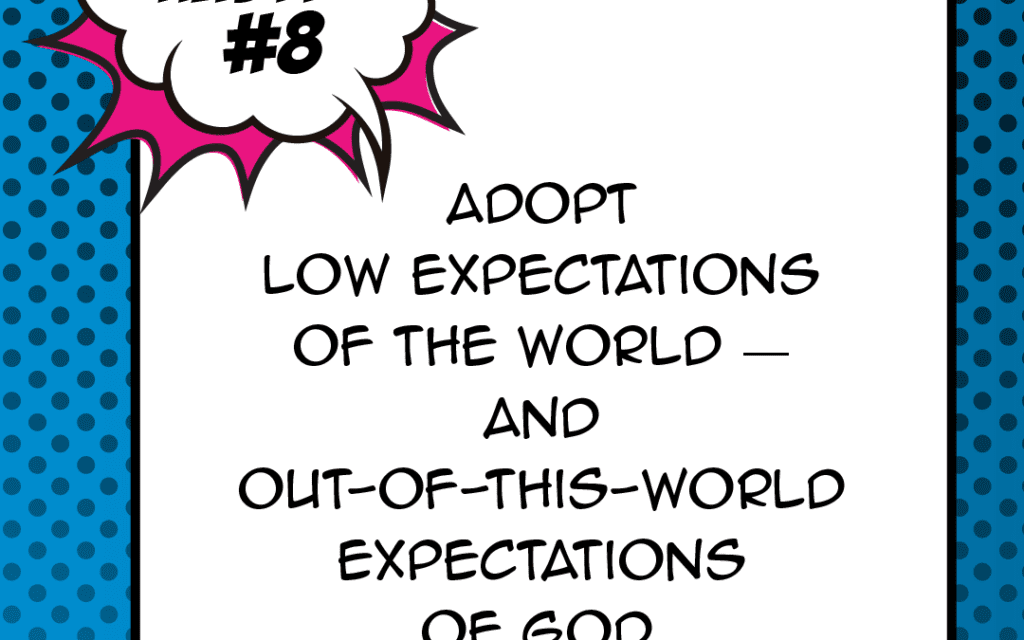
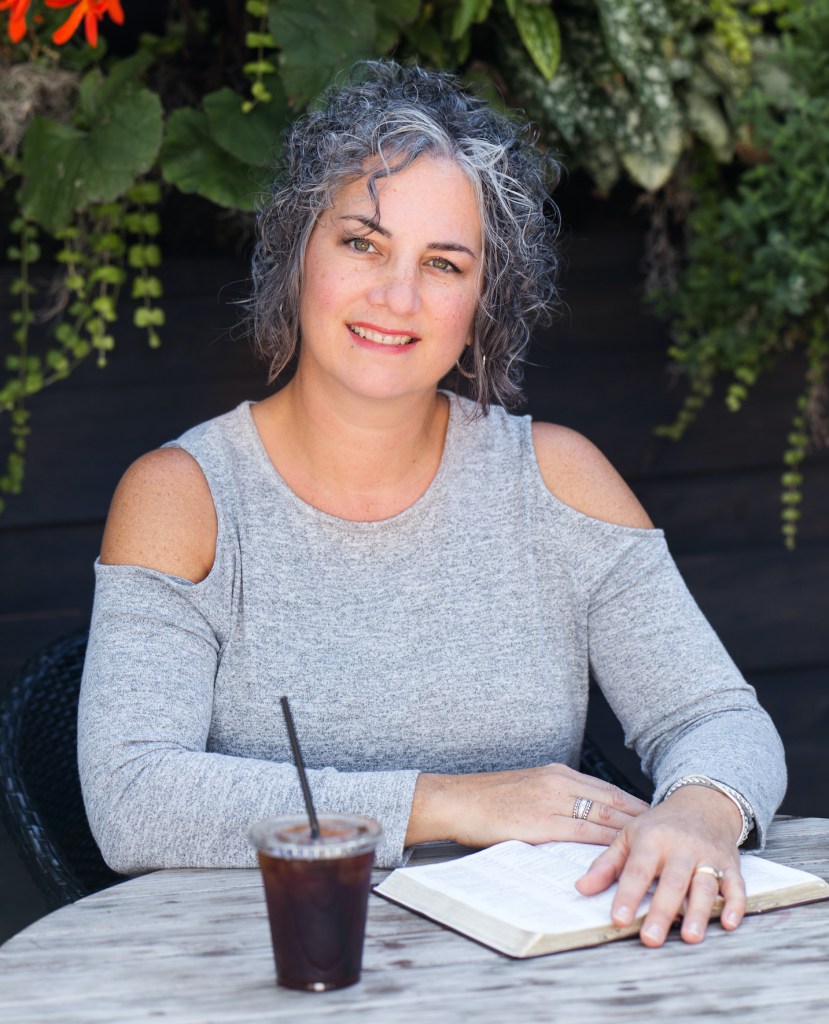
Lisa Jamieson is a caregiver consultant, pastoral counsellor and author of popular books and Bible studies including Finding Glory in the Thorns and Jesus, Let’s Talk. Lisa and her husband, Larry, live in Minnesota with the youngest of their three grown daughters, Carly, who has Angelman Syndrome. Together, the Jamiesons founded Walk Right In Ministries in 2008, a non-profit organization building faith and community with special needs families.
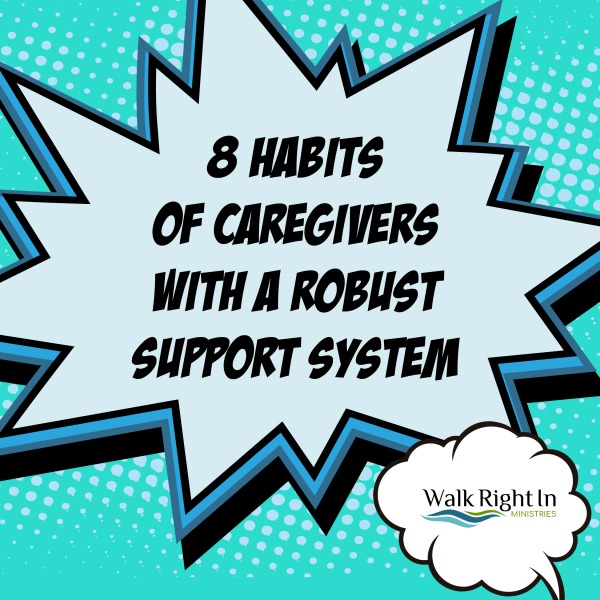


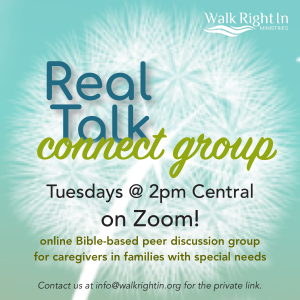

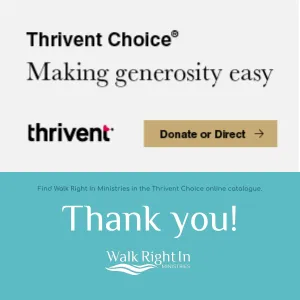


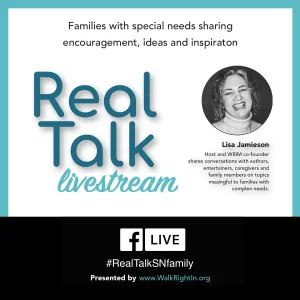
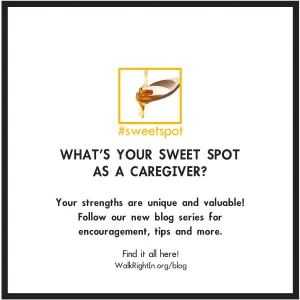

0 Comments